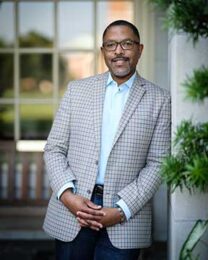Summer Institute to focus on environmental justice reporting

Wake Forest University will host its first Summer Institute dedicated to advancing environmental justice reporting in the southeast from June 26-30.
This environmental justice initiative is a collaboration between Wake Forest’s Program in African American Studies and journalism program with support by a major grant from the Andrew W. Mellon Foundation. The goal is to provide community members and scholars with stories that both inform and inspire action to address environmental concerns in under-resourced communities of color.
The centerpiece of the University’s program is a journalism fellowship.

Melba Newsome, Wake Forest journalism professor and Summer Institute director.
During the week-long Institute, five journalism fellows will meet with instructors experienced in environmental and climate change reporting. To allow time to focus deeply on their coverage area, each will receive a stipend for their work.
“The editorial and financial support will allow them to tell comprehensive stories that might otherwise be out of their reach,” said director Melba Newsome, a journalism professor and an independent journalist. “The fellowship is a tremendous opportunity for early to mid-career journalists to pursue ambitious environmental justice reporting projects.”
Fellows will tour Winston-Salem and areas impacted by the Weaver Fertilizer Plant fire in 2022. They will also meet with environmental justice leaders and learn from experts in the field.
The Institute’s journalism instructors are:
- Vann R. Newkirk II, senior editor at The Atlantic, and the host and co-creator of narrative podcasts Floodlines and Holy Week.
- Ashley Smart, associate director of the Knight Science Journalism Program at MIT and a senior editor at Undark magazine.
- Maya L. Kapoor, journalism professor, science writer and editor who writes “On the Move,” a column in High Country News that examines how the climate crisis is shifting life in the American West.

Corey Walker, professor and interim dean of the Wake Forest School of Divinity.
“The environmental crisis is also a crisis of understanding,” said Wake Forest Professor of the Humanities Corey D. B. Walker, who leads the African American Studies Program and is interim dean of the School of Divinity. “The Institute is designed to address this crisis by creating new knowledge born out of the creative collaboration of scholars, journalists, activists and citizens.”
The Summer Institute is the launch of a series of collaborations between departments and programs at Wake Forest University. The scope of work funded by the Mellon Foundation will extend across campus and into the community. Learn more about the Mellon Foundation’s support for environmental justice projects at Wake Forest.
2023 Summer Institute fellowship award winners
The completed reporting projects will be published by a variety of news outlets and will be made available on the Program in African American Studies website for public and scholarly reference.
- Adam Mahoney (Capital B) will produce a 5-part series focused on the environmental and social injustices impacting poor and middle-class Blacks through the southeast.
- Eileen Rodriguez (WFDD) will investigate working conditions and the environmental effects of working in meat processing plants for the primarily Latino workforce.
- Xander Peters (Environmental Health Sciences) will take a deep dive into the environmental impact on fenceline communities as the Gulf Coast continues to expand what is already one of the world’s largest refinery corridors.
- Jenae Barnes (Apple News Editorial Fellow) will look at the new EPA proposal to regulate the amount of “forever chemicals” in drinking water, marking the largest historic sweep of environmental water safety since the Clean Water Act 50 years ago.
- Will Atwater (North Carolina Health News) will chronicle the history of North Carolina’s environmental justice movement.
Categories: Top Stories
Wake Forest News
336.758.5237
media@wfu.edu
Meet the News Team
Headlines
Wake Forest in the News
Wake Forest regularly appears in media outlets around the world.




